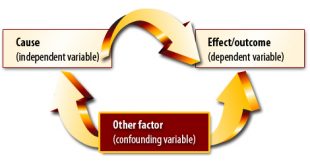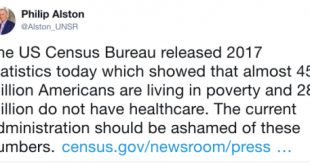from Deniz Kellecioglu and the current issue of the RWER The academic field of economics has been under an intensified pressure after the Global Financial Crisis (GFC), which began in September 2007 (cf. Backhouse 2010). This pressure involved demands to refine, reform, or completely overhaul the field. The latter group viewed the GFC as another dismal outcome of a dominant economics that is significantly supportive of financial interests, while being hostile to states, peoples, and the...
Read More »Wren-Lewis insults medical science
from Lars Syll In a discussion today on twitter one discussant was questioning if economics really could be considered a science, adding that in physics — contrary to economics — “there are no different school of thoughts on ‘Newton’s Laws of Motion’. To this Simon Wren-Lewis answered: Exactly the same is true of mainstream economics. There are also groups who cannot live with the mainstream who form schools of thought, like MMT. But mainstream economics is a science, like medicine. But...
Read More »Those lumps matter
from Peter Radford I feel bad for anyone who ventures into the social sciences. Society is, after all, a devilishly complex subject. Pull on any one string and you can convince yourself that you have understood it only to realize the next day that you missed the entire story. It’s a maze: enter at your own risk. Of course the flip side is that you can never be entirely wrong either. Just about any half-baked idea has a smidgeon of truth hidden within it. Take a look at mainstream...
Read More »Econometrics and causality
from Lars Syll Judea Pearl’s and Bryant Chen’s Regression and causation: a critical examination of six econometrics textbooks — published in Real-World Economics Review no. 65 — addresses two very important questions in the teaching of modern econometrics and its different textbooks — how is causality treated in general, and more specifically, to what extent they use a distinct causal notation. The authors have for years been part of an extended effort of advancing explicit causal...
Read More »Sciences of inequality
from David Ruccio Last month, Philip Alston, the United Nations Special Rapporteur on extreme poverty and human rights (whose important work I have written about before), issued a tweet about the new poverty and healthcare numbers in the United States along with a challenge to the administration of Donald Trump (which in June decided to voluntarily remove itself from membership in the United Nations Human Rights Council after Alston issued a report on his 2017 mission to the United...
Read More »All-time most viewed RWER Blog posts
Title Views Summary of the Great Transformation by Polanyi 50,877 Citigroup attempts to disappear its Plutonomy Report #2 42,171 Reflections on the “Inside Job” 21,729 25 graphics showing upward redistribution of income and wealth in USA since 1979 21,190 Emerging vs. developed countries’ GDP growth rates 1986 to 2015 20,221 Keen, Roubini and Baker win Revere Award...
Read More »The connection between cause and probability
from Lars Syll Causes can increase the probability of their effects; but they need not. And for the other way around: an increase in probability can be due to a causal connection; but lots of other things can be responsible as well … The connection between causes and probabilities is like the connection between a disease and one of its symptoms: The disease can cause the symptom, but it need not; and the same symptom can result from a great many different diseases … If you see a...
Read More »Hype and facts on free trade
from C. P. Chandrasekhar Voices questioning the claim that nations and the majority of their people stand to gain from global trade are growing louder. The one difference now is that the leading protagonist of protectionism is not a developing country, but global hegemon United States under Donald Trump. Free trade benefits big corporations with production facilities abroad, Trump argues, while harming those looking for a decent livelihood working in America. With time Trump has made...
Read More »The connection between cause and probability
from Lars Syll Causes can increase the probability of their effects; but they need not. And for the other way around: an increase in probability can be due to a causal connection; but lots of other things can be responsible as well … The connection between causes and probabilities is like the connection between a disease and one of its symptoms: The disease can cause the symptom, but it need not; and the same symptom can result from a great many different diseases … If you see a...
Read More »Corporations continued
from Peter Radford The key to understanding corporations is to separate the economics from everything else. We need to do this because the economics, as expressed in various theories of the firm, are usually entirely idealized and bear no resemblance to reality. Economists, as usual, love to theorize about things that don’t exist but which they wished did exist. But that may just be me being dismissively judgmental. Corporations, far from being products of the free market, are actually...
Read More » Real-World Economics Review
Real-World Economics Review




